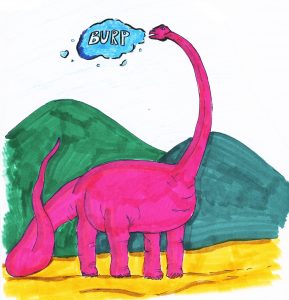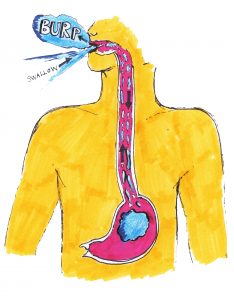
Author: Layal Bou Abdo MSN
Illustration: Angeline Boswell
It is sometimes loud, sometimes silent, in some instance, it is socially accepted and in other gross. It happens to everyone, and it can be embarrassing sometimes when it happens, but everyone does it! Even dogs, sheep, cows and dinosaurs Buuuuuuuurp! …and Fart!
The medical name of burp is eructation and doctors like to call it, belch. Fart is called flatulence.
Why do we burp?

Our digestive system’s job is to digest or break down the food into nutrients and energy for the body to use. The digestive system has different parts or organs. You can see some of those organs from the outside, like the mouth, tongue, teeth and throat. Others are inside your chest and belly that you cannot see!
When you mash and swallow your food, it goes to the food tube in the chest or esophagus. The esophagus is a long flexible tube that connects your mouth to your stomach.
The stomach is a big pocket, where the food stack and contains acid that helps to break down the food. The stomach can stretch a bit allowing all the food to fit in like a balloon.
You swallow a bit of air into your stomach every time you eat, drink, talk, chew gum, or yawn. When your belly stretches to its maximum capacity, it releases the air back up your esophagus and out to your mouth and nose. The result: Oops! Excuse me! The esophagus vibrates as it releases swallowed air from your stomach.
Burps allow the stretched stomach to go back to normal.
But is it just air?
If we swallow air, we burp air!
If you drink soda or sparkling water, the small bubbles inside of it are a gas called carbon dioxide is to be blamed.
Some kind of food gives you lots of burps as it produces some gases as it takes some time for your body to break down, like cabbage, broccoli, beans, peas, bran or bananas.
In addition to this, the air that did not escape from the stomach move down to the intestines where good bacteria present in our intestines break down the undigested food, they produce various gases. These gases sometimes move upwards to the stomach, thus leading to a burp. These gases are carbon dioxide, hydrogen, methane and sulphites (that stinky one, like a rotten egg smell). That is Gross!
How often do people burp?
Between 6-20 times each day. Babies are big “burpers” because they gulp in too much air while nursing! Babies have to be burped by mum and dad because they are unable to sit upright!
Try to burp when you are laying on your back! Could you?
Just remember to put your hand on your mouth and say excuse me!
Do Dinosaurs burps?
We are answering this question for Logan (5 years old).
Dinosaurs, not just burp and fart. Their belch and flatulence may have helped keep an already overheated world warmer 200 million years ago. Scientists have discovered that large dinosaurs made a big contribution to the greenhouse effect back then. They made the Earth a comfortable place to live in.
*The greenhouse effect is a process that occurs when gases in Earth’s atmosphere trap the Sun’s heat.
Why do we fart?
We fart because of the buildup of gas in our bodies. This same air that we couldn’t belch.
Gases are also what can make farts smell bad. Tiny amounts of hydrogen, carbon dioxide and methane combine with hydrogen sulphide and ammonia in the large intestine to give the gas its smell. P.U!
The medical name of a fart is flatulence.
Fun Facts:
- In some cultures, burping after a meal is considered to be a compliment for the cook. India happens to be one of them!
- Astronaut burps in space come with some food particles. This phenomenon is called wet burping or regurgitation.
- The longest burp ever recorded is 1 minute 13 seconds and 57 milliseconds long and was achieved by Michele Forgione in Reggiolo, Italy, on June 16, 2009.
- The loudest burp ever recorded was 109.9 decibels and was achieved by Paul Hunn in Bognor Regis, United Kingdom, on August 23, 2009. That’s louder than the roar of a motorcycle or chainsaw!
- Burp is as fast as 60 and 70 mph (96-112 Kmph).
- The burps of ten cows could heat a small house for a year.
- 99% of farts are odourless.
- Most people fart about 14 to 22 times a day.
- Farts are flammable, keep away from fire.
Watch this video to learn more about burb with a fun experiment in the end.
We are certain your kid asks you health (human & animal) questions that genuinely leave you stumped! Leave a comment below and we are happy to answer “why” in future blogs.
Copyright © 2021 Little Medical School Ottawa


[…] have covered in a previous blog, why do we pass gases and all about bacteria that live inside […]
What are the medical terms for burping and farting, and what are the common names used for them?
Great question: Burping can be referred to as eructation or belching, while farting is known as flatulence or passing gas. Common names are the terms we utilized in the article, and these are the terms that children enjoy using and hearing in our classroom.